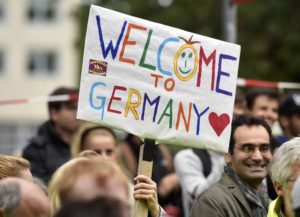Germany’s great migration experiment
 As tens of thousands of people took to Berlin’s streets this week in protests on either side of Germany’s migration debate, there was a much talk about a demographic crisis.
As tens of thousands of people took to Berlin’s streets this week in protests on either side of Germany’s migration debate, there was a much talk about a demographic crisis.
New research shows that Germany is facing a demographic crisis – but not the one the protest groups in Berlin were arguing over.
This crisis is not about an influx of refugees. It is about population that is aging rapidly with jobs going unfilled.
Over the next decade, Germany is going to need even more — not fewer — immigrants to keep its economy on track and cover a growing pension bill.
A leading German think tank has warned labour shortages could cost the economy almost one per cent in lost gross domestic product and a shortage of three million skilled workers by 2030.
Growing numbers of German politicians are speaking about immigration through the prism of security threats, stolen jobs and a welfare burdens.
This even when migrants could help fill the estimated 1.6 million job vacancies.
But outside of political rhetoric, Germany’s approach is pragmatic with refugees being fast-tracked into schools, vocational training and jobs.
The nation is ramping up efforts to turn Iraqi, Syrian, Afghan and other refugees into taxpaying workers.
Refugee arrivals have fallen dramatically since a peak in 2015 peak when nearly 900,000 people seeking political asylum crossed the border.
Arrivals in Germany were just 280,000 in 2016, and then to 186,600 last year.
Germany’s net immigration in 2016 was 500,000 people, from the European Union and elsewhere.
Germany can’t get enough skilled migrants through official channels so it is using what it has – a large number of young male foreigners who are being urged into apprenticeship schemes that young Germans are eschewing.
Germany has become a testing ground for a large scale labour integration exercise that has never been tried before.
The plan is to teach refugees the German language and cultural norms, and then the skills necessary to join German workers in factories and hospitals.
Overall, Germany plans to spend €3.2 billion, or about $5 billion, a year on integration.
The challenge involves more than just scale. Poor language skills, insufficient qualifications, cultural alienation, discrimination, bureaucracy and uncertain legal provisions have thrown up barriers that require constant rethinking and adjustment.
Germany did not set out to solve these challenges with a single policy. Rather, since 2015 it has been in trial-and-error mode identifying what works and what doesn’t.
Among the changes have been a relaxing of asylum rules so that skilled and hardworking refugees and asylum seekers can stay in Germany and learn a trade.
Now, asylum seekers can enter the work force just three months after arrival.
Another step has been to beef up language and cultural orientation courses.
Though offered by the federal migration and refugee office for years, the curriculums have been revamped and are now available to most newcomers, not just those who are officially recognized as refugees, as in the past.
Now, 20,000 teachers offer classes at 8,800 locations across the country. According to the latest figures, around 340,000 people have signed up for the courses.
Despite a few setbacks, there is evidence of success.
Among the refugees who arrived in 2015, before most of these initiatives began, about 9 per cent had found jobs by 2016, while 31 per cent of those who had arrived in 2013 were working.
In 2017, the number of graduates from the vocational training was four times the number in 2015.
Economists say that a plausible best-case scenario is 50 per cent or 60 per cent of the current refugee population being employed five years from now — a prediction contingent on successful integration.
If this happens, the economists say that Germany can accommodate a net migration of about 700,000 people a year.
The world will be watching with interest.
Laurie Nowell
AMES Australia Senior Journalist












